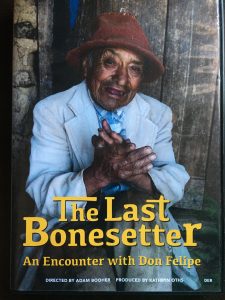
From the March 2021 Desktop News | When anthropologist Dr. Kathryn Oths released her film, The Last Bonesetter, in 2018, she was excited that it would reach students and researchers across the globe interested in studying traditional medical communities in Latin America. Now, the film will show at the prestigious Royal Anthropological Institute (RAI) Film Festival in London, where her life’s work will be able to reach a larger audience than ever before.
The film follows a huesero, or bonesetter, named Don Felipe, who healed the musculoskeletal ailments of his community in the Andes of northern Peru through manipulation, massage and herbal remedies. He was quick to diagnose and correct, relieving a burden from his village located many miles away from the nearest hospital. But, as Oths discusses in her film, economic decline, climate change, and a migration of young people from remote areas to coastal cities left Don Felipe one of the last traditional health care practitioners in the region.
Oths, a longtime advocate of preserving indigenous knowledge, knew that this ancient practice was one worth saving for generations to come. With the help of director Adam Booher, a UA alumnus, as well as several members of the local community, Oths was not only able to document Don Felipe’s skills for the camera, but organize a two-day workshop at a regional hospital for healers and physicians from around Peru to learn from him.
“Don Felipe was a master of his practice, but it was difficult for him to talk about things abstractly,” Oths said. “But if you gave him a broken finger or some other ailment, he could tell you what to do while he was fixing it. So we thought showing the regional health care practitioners exactly what he was doing would be perfect. We advertised on the radio and brought together academics, doctors, local healers, and peasant farmers from the highlands to receive treatment and learn from him.”
Since the film’s release, Oths and her team have received praise from multiple organizations, including an honorable mention by the Jury for Music at the Archaeology Channel International Film Festival in 2020. The film has also been shown at the Ethnografilm Festival in France, the Society for Visual Anthropology Film Festival, the First Medical Anthropology Symposium in Peru and the Society for Applied Anthropology in Vancouver. However, having her film shown at the RAI is, for Oths, a dream come true.
“This is perhaps the most eminent anthropological film festival in the world,” Oths said. “It’s like the Sundance of anthropological film festivals. It’s definitely one of the greatest honors I’ve ever received.”
This year’s RAI Film Festival is entirely virtual, and participants can watch all of the selected films March 19-March 28. The Last Bonesetter is included in the category Shorts 09 – Indigenous Knowledge. To view the film, as well as other films from the Royal Anthropological Film Festival, visit the festival’s website.